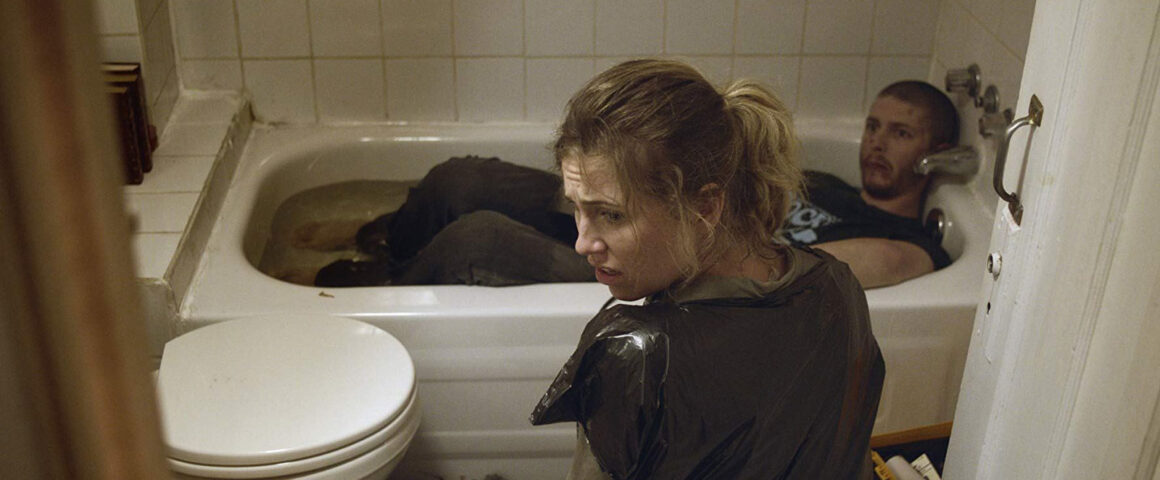The juxtaposition of comedy, tragedy and horror is a tricky thing to pull off. Lean too hard one way and the comedy can be inappropriate or just lame and unfunny. Lean another way and the tragedy can be unintentionally comical or painful. And lean the third way and the horror can be silly. Those films that manage this balance, such as “An American Werewolf in London” and “Shaun of the Dead,” often achieve significant status among fans and critics. Those that do not, get forgotten.
With Dead Dicks, Chris Bavota and Lee Paula Springer are not likely to attain the status of John Landis and Edgar Wright, but they do manage to deliver an entertaining and impressive combination of the various tones. Bavota and Springer make a virtue of simplicity, containing the bulk of their drama within an apartment. This containment is the film’s greatest strength. There is a tragic element as characters are trapped on both a physical and emotional level, which is combined with a strong thread of body horror. And there is comedic interplay, heightened by the tension of the environment where humor is the only escape.
Within this complex combination, Dead Dicks depicts a strained but nonetheless devoted relationship between brother and sister. Becca (Jillian Harris, “Love or Lust”) is the younger sister with greater maturity, professional skills and good job prospects. Richie (Heston Horwin, “Rock Steady Row”) is the older brother plagued with mental and, as becomes clear, rather unique physical, health problems. The film somewhat reverses the Gothic tradition here, as Richie is governed by emotion and, being in a top floor apartment, something of a mad man in the attic. Becca, a neuroscience nurse, tries to apply scientific knowledge and method to the increasingly strange events that she encounters.
Richie’s apartment allows for a claustrophobic sense to pervade the film, director of photography Nicolas Venne making good use of low angles and tight framing to hem the characters in. Sudden appearances and disappearances provide jumps both comedic and horrific. Mark J. Pragai’s production design smartly turns the apartment into a mishmash of art gallery and bachelor pad cliché. Retrospective elements pervade the film, including a computer, TV set and camcorder seemingly from the 1990s, as well as references to cassettes and an amplifier. These elements might place the film in a period setting were it not for the up-to-date laptop and smart phones (complete with text messages appearing on screen), giving the film a peculiarly imprecise time. But as becomes apparent, repetition and copying are key to this film. “Fight Club” fans may notice a possible reference, which even if unintentional shows the pervasiveness of a particular concept.
The film is largely a two-hander and the banter between the siblings is believable. Much of their interplay is humorous, especially the moments involving a naked Richie. Male nudity is something sorely lacking in cinema, and Dead Dicks features an exposed penis in a way that is refreshing and funny due to sudden appearances and Becca’s embarrassed reactions. However, the film’s most affecting moments are more melancholic. Becca’s legacy of resentment over being effectively her brother’s career is recounted through a long take on her face; a long confession by Richie is captured in a similarly continuous shot. Visual tropes like these compensate for the somewhat stilted performances, allowing the siblings’ relationship to be touching and perhaps recognizable to viewers with difficult relationships with their brother or sister. The most comedic figure is Matt (Matt Keyes, “X-Men: Dark Phoenix”), Richie’s downstairs neighbor who is looped into the narrative periodically. Sometimes his inclusion works — such as the cutaways to Matt exercising in his apartment where he comes across as absurd — other times it feels forced. That said, Matt does produce the biggest laugh of the film, in a moment involving a drill.
As a comedy-horror of body and mind, the film manages the body quite well, as bodies are used to both comedic and horrific effect, echoing Babak Anvari’s “Wounds” in one key respect. Mental health on screen is always a tricky prospect, as genuine psychological problems are not necessarily cinematic and thus receive short attention (see “Midsommar” for a recent example of a throwaway reference). Dead Dicks does not attempt to explain or even identify Richie’s problem, which may be frustrating or an acknowledgement that it is simply a narrative device to bring these characters into the situation that the narrative requires. Interestingly, the film does take the issue of suicide seriously, including a public service announcement at the beginning about help available for those suffering, and also presenting some suicide attempts that are genuinely uncomfortable to watch. For the most part, the film’s treatment of this subject is effective, although the ambiguity at the end is a sudden swerve that lacks connection to what has come before. As a contained depiction of a fractious relationship with a deft balance between comedy, horror and tragedy, Dead Dicks is a slight film but still an enjoyable one.



